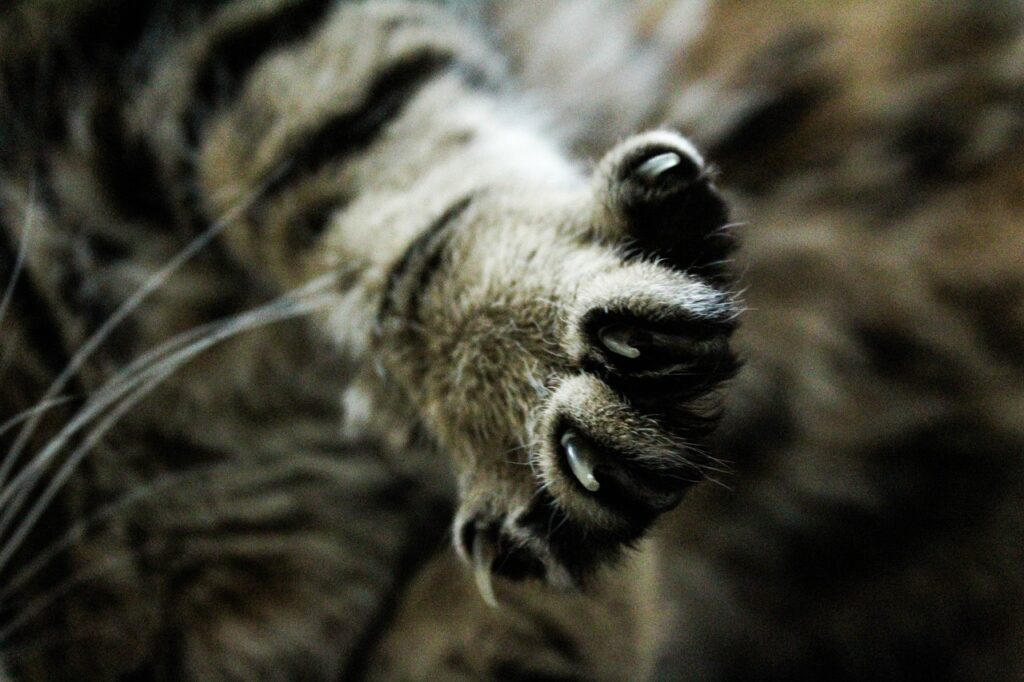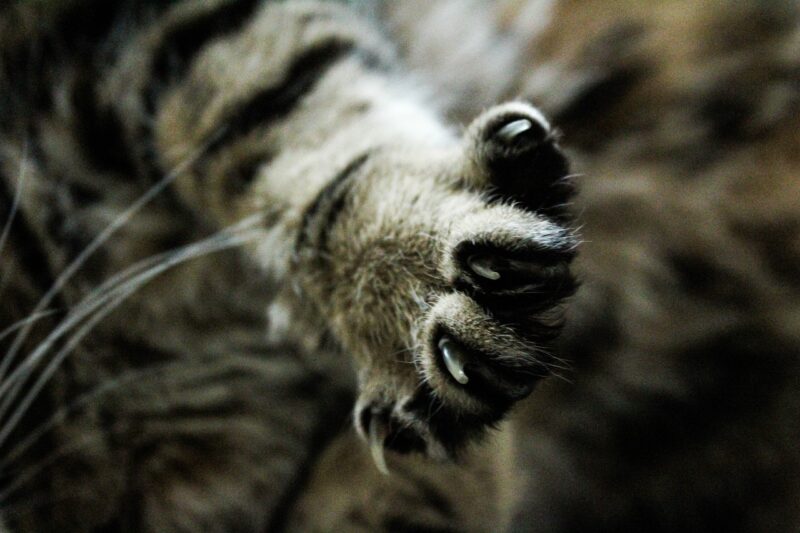For humans, biting of nails indicates nervousness, or simply a bad habit that they must overcome. However, it is a common grooming behavior for cats, but only up to a certain degree.
Cats bite their nails as part of their grooming habit. After all, they are one of those animals who are capable of keeping themselves clean. However, excessive chewing and biting of nails may also indicate underlying health issues.
Therefore, if you own a cat, you should be observant in determining if nail biting is only part of their habit, or there could be something more serious behind their behavior.
For this article, you’ll get to know why cats bite their nails, when it should be a concern, and what you can do about it.
Read on to find out why cats bite their nails and when you should be concerned.
When is nail biting considered normal for cats?
For cats, nail biting is considered normal when they do it as part of their grooming process. Cats clean their paws to remove litter, dirt, or debris that they may have gotten while playing. This is especially true for cats who love to spend their time outside the house.
Another reason why cats would naturally bite their nails is to remove the nails that are already worn out, weary, and even cracked. Because their nails grow in many layers, they can easily discard the dull ones to expose the fresh, sharp claws.

When is nail biting considered a serious concern?
While it is true that your cat is not on your view all the time, there are signs which may indicate that your cat’s nail biting is problematic and should be taken seriously. Some of these are:
- You notice them biting their nails more frequently than they usually do;
- You see them bite too often and hard that their claw begins to bleed;
- You notice redness, irritation, loss of hair, or even exposure of skin near their claws or nails because of nail biting;
- You notice one or more indicators mentioned above and change in their behavior, such as aggressiveness or biting.
Why do cats bite their nails?
When your cat’s nail-biting behavior is considered abnormal, here are some of the possible reasons behind it:
1. Lack of tool or item where your cat can claw
When your cat lives indoors and does not have a scratching post or board where they can claw, they may resort to biting their nails to keep their nails sharp and useful. Raising an indoor cat does not mean that you should provide them with only food and water. You should also be knowledgeable about their other needs, including a scratching post or a scratching board.
2. Autoimmune disease
Autoimmune diseases, including pemphigus, can cause irritation on a cat’s skin, usually on their paws, genital area, and parts of their face, including eyelids, ears, and nostrils.
When pemphigus affects a cat’s paw, this could result in lesions on their toenails. Being hygienic animals, cats will try to lick their toenails in an attempt to remove the lesions, which can lead to excessive biting of nails.
3. Infections
Feline dermatophytosis is rather a common skin disorder for cats. Caused by yeast or fungal infections such as ringworms, these infections can be acquired from soil. Fortunately, thorough grooming can remove the fungi most of the time.
However, when the fungi cling onto the cat, this can result in infected nails, hair loss, scales, which, in turn, can cause a cat to groom itself excessively due to irritation and discomfort.
4. Other infections
Aside from yeast and fungi infections, cats may also suffer from bacterial infections, leading to excessive biting of their nails.
At home, observe if your cat reacts negatively to chemicals that you use on your floor and surface.
5. Tumors
The presence of a tumor in a cat’s nail bed may also be one of the reasons why a cat excessively bites its nails. Sometimes, a tumor may result in the development of a scab in cats and when they bite it, that’s when it starts to worsen.
Therefore, if you are unsure as to why your cat repeatedly pulls its claws or bites its nails, it is highly suggested to visit the veterinarian right away as it may be because of the presence of an underlying medical condition. Fortunately, early detection of tumors and cancer can give a high chance to save and prolong your cat’s life.
6. Old age
If you have an old cat who bites its nails excessively, it may be due to hormonal imbalance which causes their nails to be too thick, too brittle, or too soft. Because of the sudden changes on their nails, they may try to bite it as a way to maintain its condition.
7. Presence of other animals
Your cat might freak out or get too excited whenever it sees, or even catches a scent of other animals, such as squirrels or rabbits.
If your house lives indoors and can only see nature through the window and there’s no chance for them to chase other animals outside, they may choose to bite their nails instead.
8. Trauma
For cats, claws are a very important ‘tool’ that they need to have. When a cat suffers from injury that causes their claws to crack or break, they can develop nail-biting habits. This is especially true to kittens or younger cats who are very active.
9. Behavioral problems
Lastly, behavioral problems caused by stress or anxiety can greatly affect a cat’s behavior. Aside from excessive grooming which includes nail biting, a cat that is suffering from behavioral problems may also experience hair loss and pica – a compulsive eating disorder which can cause a cat, and even humans, to eat non-edible foods, such as cardboard, paper, and more.
Stress and anxiety for cats can be caused by several factors, including loneliness, boredom, being in a new and unfamiliar environment, presence of other animals (which we mentioned earlier), and changing their food. Furthermore, it is important for you to understand your cat’s behavior through their common body language.
What can you do to alleviate your cat’s abnormal nail biting behavior?
Here are some of the things you can do to help your cat relieve their abnormal nail-biting behavior:
1. Reduce your cat’s stress
To help reduce your cat’s stress, you must first determine what triggers their stress in the first place. Is it because of the neighbor’s noise? A new pet in the house? A large number of people that visit your house often?
In most cases, cats prefer having a safe place where they can stay privately, on their own. Therefore, by providing your cat with a cozy, quiet area will be of great help to reduce their stress and keep them away from any stressors.
2. Observe how your cats interact with other cats in the house
If you have multiple felines in the house, or you recently added a cat in the house which resulted in stress in your resident cat, you may need to introduce them again.
Remember that cats don’t like to share. They like to have their own food and water bowl, and their own space, so make sure to provide those per cat.
3. Provide your cat with stimulating activities
As mentioned earlier, a cat may develop behavioral problems due to boredom. This is especially true for cats who stay indoors all the time. To keep your cat busy, provide them with fun activities that will keep their mind and body working most of the time.
Give them a variety of toys that they can play with, provide them with high areas where they can climb, walk, play, or rest, or you can also make a closed box or hideaways where they can stay whenever they need ‘me time’.
4. Maintain a routine
Cats do not fancy varied procedures. Instead, they thrive on strong routines. You can do this by feeding your cat at the same time every day, cuddling with them at the same time every day, and taking them out and playing with them for a specific amount of time every day.
When a cat looks forward to an activity at that specific time, it helps alleviate their restlessness, which, in the long run, can put an end to excessive nail-biting behavior.
5. Consult the veterinarian
If all else fails, or when nail-biting is accompanied by bleeding, hair loss, scabs, redness, or any signs of infection, then it is the time to bring your cat to the veterinarian immediately as they know best what to do in such situations.
Final Thoughts
Overall, it is imperative for you to closely observe your cat’s behavior before taking the next action.
Again, nail-biting for cats is common as it is part of their grooming procedure, but only up to a certain level. Observe your cat, and if you think their nail-biting behavior is starting to get unusual, you can always try the suggestions above. Or, if they are starting to get aggressive and you think that they need immediate attention, you can always make a schedule for a veterinary consultation. If not treated early, your cat’s excessive nail-biting behavior can lead to more severe health concerns.
References and Further Reading
